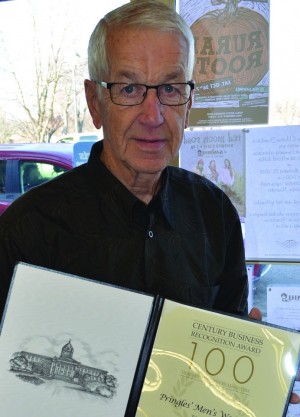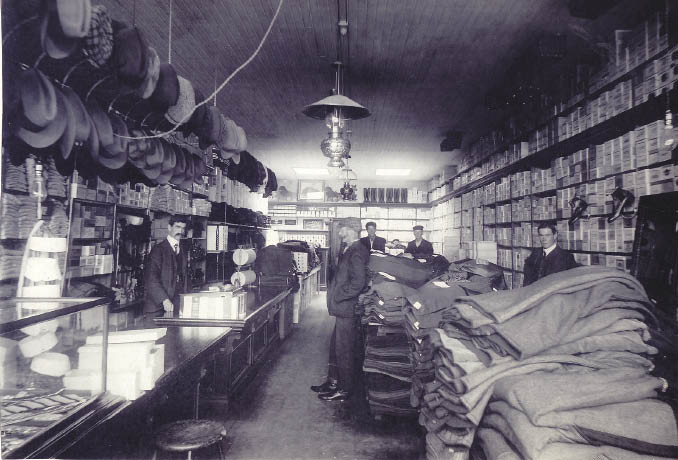Century farms are rare enough, but family-owned rural retailers that have managed to survive — and even thrive — in the era of big-box megastores are even harder to find.
Pringle’s Men’s Wear, one of three retailers awarded the province’s new Century Recognition Business Awards, has managed to buck the trend.
About a decade ago, at a time when the decline of mom-and-pop stores started to pick up speed, Wayne Pringle and son Ken were moving out of the old store the business had occupied since 1898 and into a new location that was twice as large.
Read Also

Spoken questions are what make it an interview
Recently, I was exchanging emails with the media email account at a government agency, hoping to reach a source for…
 “Our business gets bigger every year — we draw from a huge area,” said Wayne. “There’s basically no men’s wear stores left anymore in rural Manitoba. Years ago, every small town used to have one.”
“Our business gets bigger every year — we draw from a huge area,” said Wayne. “There’s basically no men’s wear stores left anymore in rural Manitoba. Years ago, every small town used to have one.”
On a Wednesday afternoon, the immaculately dressed elder Pringle could be seen gliding noiselessly across the carpet of his 5,000-square-foot store, cracking jokes, answering phone calls, and serving a steady stream of customers with a ready smile.
He and his brother Del bought the operation in 1963 from the founding family that owned Welch’s Men’s Furnishings, which originally specialized in shoe sales and repairs when it opened shop in 1894.
Third generation
Now, three generations of Pringles work in the store, along with a handful of staff.
There’s a wide variety of work clothes, shoes, and sporting goods — not to mention about 150 complete men’s dress suits on their rack that are a notch or two higher in quality than those sold by the chain stores about 40 minutes away in Brandon. And they also do trophy engraving, sharpen skates, and repair the new-fangled hockey sticks that cost $300 each.
After 51 years in the business, Wayne has learned a thing or two about retail.
Service is the key to beating the big-box giants. That means no commission sales, and honesty in all dealings. If something looks ridiculous on a customer, he tells them. But gently, of course.
“I’ve been to those big stores. It’s all, ‘Oh yeah, everything looks good on you.’ And I think, ‘God are they colour blind or what?’” Wayne said with a laugh.
In a small town with a shrinking population, a retailer can’t afford to lose a single customer, said Ken, who began his retailing education three decades ago in “the school of Wayne” at the age of 12.
“A lot of people can’t work with their parents, but for us, we get along good,” said Ken, who has since brought his own son Jay into the operation.
The two key factors were his father’s patience and his willingness to let him make his own mistakes, he said.
Staples sell
For example, when they started going to annual trade shows to book the year’s orders and stay abreast of the latest trends, Ken naturally was drawn to items that caught his fancy — not the “staple” articles that sell and pay the bills.
“He used to say, ‘If you only buy the things that you like, you won’t be in business long enough to see a season’s change,’” said Ken.
Tradition, and the store’s long history, add to the atmosphere at Pringle’s. Displayed atop high shelves are wool suits from the 1920s, a pair of the famous high-top felt boots that old-timers still insist are without equal in terms of winter warmth, a collection of antique hockey skates, and a wooden tennis racket.
As a kind of good-natured prank, the store also has a few pairs of women’s fancy high-button-up leather shoes on a top shelf.
From another time, they appear to be within an arm’s reach, but sadly out of reach, for some.
“Ladies often say, ‘I wouldn’t mind buying a pair of those.’ I tell them, those little shoes are probably 75 to 100 years old, and I don’t have them for sale,” Wayne said with a mischievous grin.
Old Mr. Welch, the previous owner, was a rich merchant, and when they took over, there was a lot of unsold inventory in storage that he hadn’t gotten rid of, he added.
That won’t cut it today.
When a line of shoes has dwindled from over a dozen pairs to just a few sizes left, Wayne whips out his red marker and slashes the price.
“Once you get down to one size 7 and one 9, what good is that to you? You’ve got to get rid of old stock. So you dump them out,” he said, adding that even though he takes a loss on those items, they draw in the bargain hunters and boost store traffic.
Ironically, the decline of the rural retail trade in neighbouring towns has boosted their fortunes. Wayne recalled how just a few years ago, Pringle’s was part of a buying group called Westman Clothiers that had six shops in Russell, Virden, Neepawa, Minnedosa and Souris.
“We’re the only store left. They’ve all closed. The people who fold blame the cities. But we carry good lines, and I know that we can compete with the cities,” said Wayne.
This year’s other winners of the Century Business award were Brown & Rutherford Co. in Winnipeg and Reesor’s Jewellery of Brandon.















